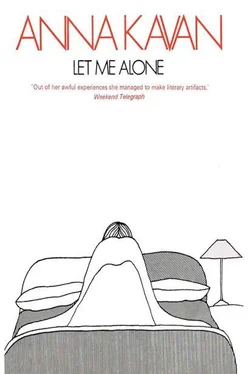Seguela was the chief link between Mascarat and the outer world. Once or twice a month on a fine afternoon she would take off the black triangular shawl that usually covered her thick, dark, greasy hair, and put on instead a full-bottomed cap of some white material. Then she would set out to visit her friends, looking like a dusty, white-headed insect as she toiled awkwardly down the rocky slope.
It was she who, when any communication became necessary between James Forrester and his neighbours, conveyed the messages and made the arrangements. The peasants disliked James, distrusted him as a foreigner in such circumstances must always be distrusted. But in his case there was something more than hostile suspicion. There was fear and there was profound opposition. A queer, black, half-insolent fear, and a definite, immense opposition, like a mountain that could never be moved.
But all the same, they came every autumn in due time and at Seguela’s summons to buy the grapes from James’s vineyards and carry them away. But always with the peculiar subterranean malevolence about them, keeping their heads averted. And sometimes the tawny, Spanish-seeming men would look up at James with a dark gleaming ferocity in their eyes, as though they would have liked to destroy him — if they dared.
It pleased James to see this ferocious glitter; as well as the silent, immovable opposition. It amused him. It gave him an ironic sense of power. Grey-faced and grim, he stood up there on the pedestal of his proud, innate superiority, the inevitable master, while their little slavish hates laid seige to him, trying to drag him down.
Anna had almost forgotten Miss Wilson. But not quite: for Miss Wilson had left behind her a parting gift that served to keep her memory alive. This was a little crucifix, a tiny silver Christ on a white cross. It was pretty; when the sun shone on it, the silver shone out prettily. It was the only thing in the nature of a trinket that Anna had ever possessed, and she wore it sometimes when she was alone, hung on a piece of tape round her neck.
One day her father saw it. He came upon her suddenly when her thoughts were far away, too far to be recalled quickly, walking silently towards her over the grass. The silver Christ flashed tell-tale in the sun.
‘What is that round your neck?’ he asked her.
She was uncomfortable at the question, silently holding out the cross for him to see.
He came near to her, breaking the tape, holding the crucifix in the palm of his hand. And a sinister insulting glaze came over his face as he looked down at the little silver Christ; his face was like a grey mask of disgust.
‘Still this religious nonsense,’ he said, in his quiet, cold voice, that had gentleness, too much queer gentleness, in it.
Anna remained silent. She did not move, although the jerking of the tape had left a red, sore streak on the brown skin of her neck.
James did not seem to be thinking about her, standing there with the harmless, pretty trinket in his hand, and the curious film of derision on his face; until he said:
‘This little toy is supposed to be the image of God, isn’t it?’
He spoke in so ordinary a tone that Anna was deceived.
‘Yes,’ she said.
A faint smile of satisfaction started under the mask of James’s face. His cold eyes had a reptilian look.
‘Then God, if there were any such person, would not like us to insult his image — wouldn’t allow it, in fact?’
He looked sideways at Anna, in sliding, insidious mockery.
She flushed, bewildered by the stealthy attack, not understanding it.
‘No,’ she said slowly, as if reluctant.
He laughed sharply, with a curious sound of gloom.
‘But, you see, there is no God, so we can insult the image with impunity.’
Anna watch, fascinated, as his thin lips pursed themselves together, and a little globe of spittle, shining like a ball of quicksilver in the sun, fell through the air on to the patient Christ.
There was a very blank silence. The spittle elongated itself and ran down slowly over the little figure, tarnishing the sun-dazzle of the silver, down towards the flat, smooth palm beneath.
Anna was a little bit afraid. True, she had almost forgotten Miss Wilson’s religious teaching. But her child’s mind was impressed by the effrontery of the gesture, the desire to insult and wound the little Christ-figure. She half expected that the heavens would fall. But nothing happened. The sky arched up, translucent and serene, above the ragged tops of the mountains.
And suddenly, James threw the crucifix away. With a slight flick of his hand that was in itself an affront, he flicked the little cross up into the blue air. It cut through the blueness, a small glittering arc, and slipped down among the stalks of the coarse grass.
‘Religion is a drug, and to take drugs is degrading,’ he said. ‘You must learn to look life in the face. Throw away your cowardly drugs, and see the truth, the ugly, cruel, ungodly truth, as it really is.’
And he went away laughing, laughing at Anna, and left the crucifix lying there.
She did not pick it up. And the next day, when she came back to the place, it had gone. Perhaps Seguela or Paul had found it and taken it away. She did not ask them.
But all the same, her father was well disposed towards her. It was strange how Anna always felt that he wished her well. James cared for no one and for nothing. But just the one slender tie that bound him to Anna, this he could not break. There was a queer thread of subtle relationship between them, almost like a secret understanding. No, he couldn’t throw off the sense of obligation to Anna. But at the same time he cherished a sort of grudge against her; a grudge of profound, ironical pity that was in some way directed against himself. He almost wanted to destroy her, to put her out of the way, as one puts a small animal out of life. She was like an animal to him, a young, useless animal that nobody wanted and for which there was no place in the businesslike world. And the responsibility rested upon him. He saw only misery for her, and the frustrations which he himself had suffered. It was a reflection upon himself. He would have liked to put her out of the misery.
Anna was pleased when he began to teach her. Miss Wilson had taught her to write, and to read from an old book in a worn black binding — Reading Without Tears. And now James began to teach her Latin and Greek, the languages he was fond of and which seemed to suit his personality. The books in the house were nearly all classics. He was writing his own intimate diary in Greek; a fat, faded brown leather book, full of the strange, neat little symbols in James’s beautiful script.
He was not a good teacher. The slightest trace of slowness on the part of his pupil was unendurable to him. At the faintest sign of wandering attention he would break off the lesson. There were many days on which he would not teach at all, driving Anna away with sarcasm or silence. He hardly ever praised her; but his sarcastic scorn was easily and frequently aroused.
Anna was intelligent and very quick. She learnt quickly because she wanted to learn, because she wanted to do as her father did, to read what he read, to imitate him. She wanted to be like him, to win his difficult approval. But also she wanted the learning for its own sake, for some subtle satisfaction it bestowed upon her. Quite soon she was reading from the plain, brownish books that were arranged so neatly in the dark, bare room.
She spoke with equal facility English, French and the Catalan dialect used by the peasants; and she read everything she could find. Petronius and Apuleius besides the more conventional classic authors, French and English essayists and an occasional newspaper. There were no novels at Mascarat.
Читать дальше












